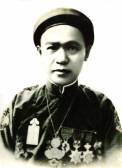Grandpa TĂNG HUYNH
Excerpt from a Memoir titled “Talking to my Children”
By Mr. Tăng thiên Thại, about his father.
Your Grandpa Tăng Huynh was born in 1882, at Minh Hương village, Hội An province. He was 88 years old when he passed away on the 2nd day of March 1970.
He studied Hán, the Chinese writing form adapted for the Vietnamese language, used throughout the country. Every year, the Kingdom opened two contests called Hương and Hội at Huế capital, to select the best candidates for careers in the local administration. Grandpa was very proficient with Hán, and he used to read and write poems in Hán. By the time Hương and Hội exams were eliminated in favor of the new Vietnamese writing using Roman characters, he had to start learning French along with the majority of his contemporaries.
Grandpa moved from Hội An to Đà Nẵng, where he studied French all by himself, and went to work for the Custom Service Office of the Center Region (Trung Kỳ) in Đà Nẵng. In the first exam organized for Việt Nam, Laos, and Cambodia to select Custom Service Inspectors, Grandpa came out number one with a very high score, outclassing the last person on the list of candidates who passed the exam of 100 points.
He was later appointed Chief of Human Resources at the Center Region office, supervising a great number of employees working in 13 provinces and cities, stretching from Thanh Hóa in the north to B́nh Thuận in the south.
Grandpa told me an interesting story about a young Frenchman with a law school degree:
Assigned to work in the Office of the Center Region, the Frenchman sometimes looked down on Grandpa who was actually his boss. The French director was aware of that situation and wanted to teach him a lesson on humility. One day he asked the man to write a memo after giving him all the necessary instructions on how to formulate it. When the Director got the draft, he turned it over to Grandpa, asking him to review it because he was too busy that day. When all that was done, the Director called Grandpa and the Frenchman into his office, and gave back to the latter his draft and asked him if he had any suggestions to offer. After reading the reviewed draft, the Frenchman respectfully said: “I am very impressed by your help in improving my draft so much.” Whereupon, the Director pointed to Grandpa and said:“ That was the person who actually corrected your draft for you.” The Frenchman quickly rose to his feet, and quite embarrassed, grasped Grandpa’s hand with both his hands and said, “Thank you, Thank you”.
From then on, the Frenchman never showed any disrespect towards Grandpa anymore.
Grandpa’s hard working habit coupled with his high intelligence and a constant desire to learn, quickly made his French became so outstanding that he was considered as the best redactor in the office. He was especially good in writing telegrams with a minimum of very concise words, so he was always requested to do it for every department.
As for his corresponding rank in the
Kingdom, Grandpa was awarded the title of “Hồng Lô Tự Khanh”, and “Tứ
Phẩm Văn Giai”, matching the rank of a District Chief in the local government.
During that period, Việt Nam’s territory was divided into provinces, each
one headed by a Province Chief (Tổng Đốc). Provinces were subsequently
divided into major or minor Districts (Phủ or Huyện) based on the number of
population, governed respectively by a Tri Phủ or Tri Huyện. Each Phủ or
Huyện were then further divided into several villages, each one headed by a
Lư Trưởng.
Grandpa’s photo showed he was wearing on the right side of his ceremonial robe a rectangular ivory medal engraved with four red Hán letters “Hồng Lô Tự Khanh”’. He was also awarded many more medals from the Nguyễn King, “Kim Tiền, Kim Khánh, Bắc Đẩu Bội Tinh, Long Bội Tinh etc..” in addition to the ones offered to him by the Kings of Laos and Cambodia. The most prestigious medal he had was offered by the French Academy, which was violet in color with two crossed olive branches. That medal was only awarded to highly respected intellectuals. The robe he was wearing was made of special velvet provided by the King, not allowed to be sold anywhere. Grandma was also given a velvet robe, the one offered by the King to the 4th rank mandarin's wife, making it easy for people to recognize her husband's rank.
With deep beliefs in Confucius teachings, he conducted his life according to the principles of compassion, thankfulness, civilization, straight mind and trustworthiness. Although he had to switch from Hán philosophy to French education, he still kept his almost knee length hair down his back, like the Hán educated intellectuals of that period. He still wore the long national costume while he went to work along Frenchmen, his long hair wrapped into a ball with a piece of fabric.
On a piece of land of 10,000 square meters planted with many types of flowers and fruit trees, Grandpa built the biggest house in that area where he settled down to enjoy his retirement at the age of only fifty, the type of peaceful and relaxing life he always preferred. Since that area did not have electricity yet, he paid the French Power Company to carry a power line to his house, thus allowing all the local people to have the same benefit.
By the time he retired, his eldest son Mr. Tăng Thiên-Huốn, who graduated with a French baccalaureat degree from a school in Hà nội, was chosen to take over his job.
Although you know how big Grandpa’s family was, there were more details I want you and your children to be aware of:
Grandpa had three wives who gave him 19 children in all, 10 boys and 9 girls. His first wife was Mrs. Phan Thị Thoan (1886-1921), the daughter of Mr. Phan Thận, of village Cẩm Hà, Quảng Nam province. Being a modest and hard working woman, she set up a small stand to sell rice, cigarettes etc., despite the fact that her husband had a quite adequate compensation as a high ranking civil servant. She ran the stand every day, making modest hard earned profit to contribute to the raising of her children. She gave birth to 6 children, 3 male and 3 female listed below:
1- Mr. Tăng Thiên Huốn. 2- Mrs.Tăng thị Gi Lớn. 3- Ms. Tăng thị Gi Nhỏ.
4- Mr. Tăng thiên Tứ. 5- Mr. Tăng thiên Tắc. 6- Mrs. Tăng thị Du.
She spoiled her eldest son, Mr. Tăng thiên Huốn, who was always found around her during his childhood. Nevertheless, she decided to let him go at the young age of ten to a well known Catholic boarding school at Huế, about 100 km. from home, to ensure that he could get the best education available. Afterward, he was sent to Hà nội, Việt Nam capital, about 1,000km from Đà Nẵng, to complete his education. He graduated with a French Baccalaureate degree, a pretty high one at that time.
She was a sweet lady with a very good heart, and was very open to help poor people in her neighborhood. In the year of the Dragon, famine struck the area, and while local merchants started hoarding rice to keep price higher, she decided to sell all her rice stock at reduced price to help people in bad need. As the daughter of a noble man, she as well as her husband, always put money below righteousness.
In order to take good care of so many children, Mrs. Thoan decided to get Grandpa a concubine named Nguyễn thị Hiếu of Quảng Nam province, who gave Grandpa just one daughter named Tăng thị Tịnh (Cô Sáu). Later on and due to unknown reason, the concubine was sent back to her family without her daughter, ending her relationship with Grandpa’s family. In her old age, Mrs. Nguyễn thị Hiếu was brought to Đà Nẵng by her daughter Cô Sáu, who took care of her until the day she died.
 After Mrs. Phan
thị Thoan passed
away, Grandpa remarried with Miss.
Đinh-thị-Thái of Huế Province, who is my
blood mother, your Grandma. She got married in the old traditional way as
decided by her parents, not knowing how her future husband looked like until
the wedding day.
After Mrs. Phan
thị Thoan passed
away, Grandpa remarried with Miss.
Đinh-thị-Thái of Huế Province, who is my
blood mother, your Grandma. She got married in the old traditional way as
decided by her parents, not knowing how her future husband looked like until
the wedding day.
Although he was 17 years older, they lived happily together until the very end. As the junior daughter of a Mandarin in the kingdom, she was quite a sweet lady. Although the family usually had quite a few helpers, a cook, 5 or 6 nannies, 2 pousse-pousse drivers etc…, I never saw her getting angry at anybody. She always treated them with calm and goodness, being such a compassionate person.
They had 12 children together, 7 boys and 5 girls:
1- Mrs. Tăng-thị-Ngộ 2- Mr. Tăng-thiên-Phú 3- Mrs. Tăng-thị-Điềm
4- Mr. Tăng-thiên-Bửu 5- Mr. Tăng-thiên-Thại 6- Mr. Tăng-thiên-Hối
7- Mr. Tăng-thiên-Tài 8- Mr. Tăng-thiên-Tư 9- Mrs. Tăng-thị-Tuân
10- Mrs. Tăng-thị-Khải 11- Miss Tăng-thị-Hồng-Vân 12- Mr. Tăng-thiên-Mân.
Grandpa was a very obedient son, and also a very honest official who respected rightfulness far more than money. Every time the Custom Service of the Central Region opened a recruitment contest, he got his house closed to visitors, in order to prevent solicitors from trying to get his help by bribing him with gifts or money.
A story he told me about one of his subordinates revealed how compassionate he was. The poor man with a big family to support became blind through illness, and was unable to continue working. Since he did not have the required seniority to receive any pension yet, Grandpa kept him on the payroll for up to one more year. Each time his boss asked him about that person, he kept saying:“I assigned him to work outside.”
Since he retired, he enjoyed a peaceful life until the war broke out, forcing his family to move into the countryside. From 1946 to 1952, a long 6 years through Quế Sơn to Tam Kỳ, he was still blessed with a happy and somewhat easy life.
In Febuary 1970, Grandpa’s health began to deteriorate due to old age and inclement weather.
When I went to visit him on the first day of Canh Tuất Lunar Year (1970), Grandpa asked for a new bed and a new suitcase. Although no merchant opened for business on that day, I was able to convince a merchant I knew well to sell me a nice new bed with a thick mattress. Your aunt Ngoc Anh also brought over a Samsonite suitcase into which we put all of Grandpa’s clothes. Lying on the new bed with his suitcase at his feet, Grandpa looked at us with a smile of satisfaction.
Grandpa was in a good mood for about a week and then drifted out of conciousness. In the afternoon of Febuary 3, 1970, I heard Grandpa exhaled lighty then passed away peacefully at the age of eighty-eight.
He was buried in the Custom Service cemetary located at the center of Đà Nẵng city.
After 1975, this cemetery was closed and Grandpa was reburied alongside Grandma in the village Ḥa Khánh cemetery, about 10 km North of Đà Nẵng. Their tomb was later rebuilt as shown in the photo below.

Grandparents’s tomb (yellow walls) standing among imposing mountains that surround the cemetery Ḥa-khánh